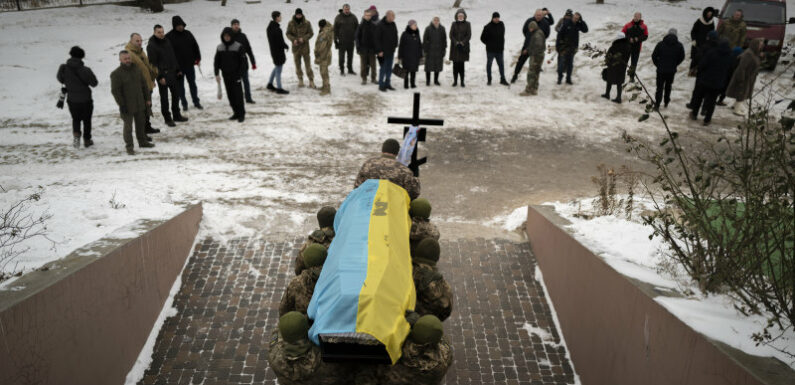
Save articles for later
Add articles to your saved list and come back to them any time.
A Moscow court has fined Wikipedia for a Russian-language article it refused to remove about Russia’s invasion of Ukraine, the latest in a series of government moves to silence objective reporting or criticism of the war and restrict the Russian public’s access to information.
The court fined Wikimedia Foundation, the non-profit that runs the free, publicly edited online encyclopedia, 2 million rubles ($36,000) for not removing a Wikipedia article titled “Russian occupation of the Zaporizhzhia region”, a reference to one of four Ukrainian provinces that Russia annexed in September. Most countries have condemned the annexation, as well as that by Russia in 2014 of Ukraine’s Crimean Peninsula, as illegal.
Soldiers walk amid destroyed Russian tanks in Bucha, in the outskirts of Kyiv in April 2022.Credit: AP
The state Tass news agency said the Wikimedia Foundation had failed to heed the demands of Russia’s state communications watchdog Roskomnadzor to remove articles containing “false information”. Tass said a Wikipedia representative asked the court to reject the removal demand as vague.
President Vladimir Putin has increased his crackdown on criticism and factual reporting that doesn’t correspond to his government’s views or versions of events. The crackdown has widened since his troops invaded Ukraine on February 24, 2022, focusing especially on information and dissent against what he calls Russia’s “special military operation” in the neighbouring country.
Through Roskomnadzor, his government has also tried, with mixed success, to technically limit Western news reports that can be seen in Russia. The BBC and some Voice of America sites are among those blocked but which Russians can access using virtual private networks.
Ukrainian soldiers carry the coffin of their fallen comrade in Bucha in January.Credit: AP
This is not the first time Wikipedia has been fined for refusing to delete information about the war in Ukraine.
Last week, the same Moscow court issued a fine of 800,000 rubles to the Wikimedia Foundation for not removing materials linked to a song by a Russian rock band called Psychea, which Russian authorities consider to be extremist.
In November 2022, the organisation was fined 2 million rubles for refusing to delete information in seven Wikipedia articles about the “special military operation”, including information about atrocities in Bucha and the destruction of Mariupol’s theatre.
In a statement on Thursday, Wikimedia’s senior legal manager, Leighanna Mixter, said the organisation had not taken down the disputed content and would continue to challenge the rulings as without foundation.
She said the “the steady stream of takedown orders” Wikimedia has received in recent months challenge information that is “well-sourced and in line with applicable Wikipedia policies – improved by Wikipedia volunteer editors with more citations and up-to-date information”.
Wikimedia has two active appeals for fines related to takedown notices for topics regarding the invasion of Ukraine – and the latest case “does not present any new legal issues,” she said.
“These orders are part of an ongoing effort by the Russian government to limit the spread of reliable, well-sourced information in the country,” she added, asserting that Wikimedia would resist all attempts to “try to curb free knowledge”.
A Wikipedia page on the issue notes, “Since the early 2010s, Russian Wikipedia and its editors have experienced numerous and increasing threats of nationwide blocks and country-wide enforcement of blacklisting by the Russian government, as well as several attempts to censor pages, spread propaganda, and disinform.”
Tass said Roskomnadzor would label Wikimedia in search engines as a violator of Russian law, and more action against specific articles was planned.
AP
Get a note directly from our foreign correspondents on what’s making headlines around the world. Sign up for the weekly What in the World newsletter here.
Most Viewed in World
From our partners
Source: Read Full Article

